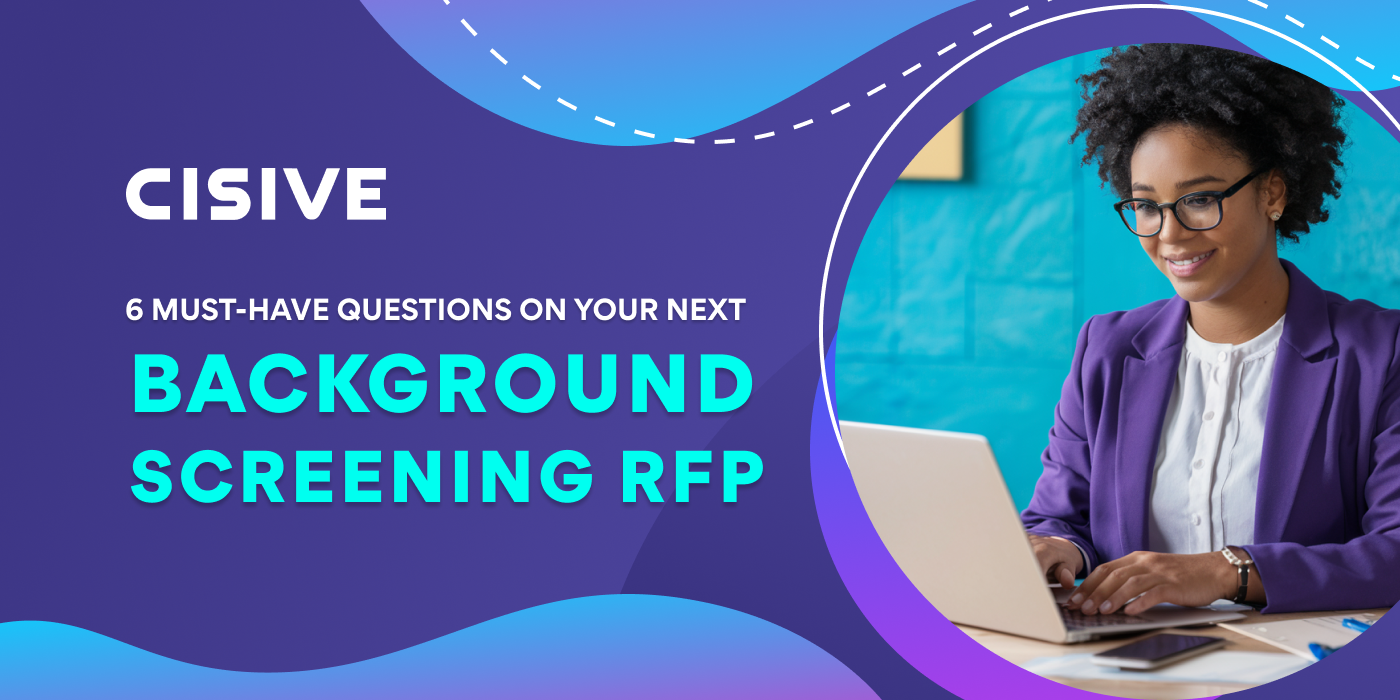
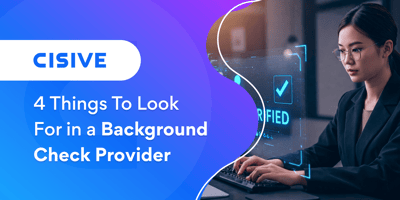
No hire is a guaranteed success. It’s frustrating to finally fill a much-needed position only to...

Human resources teams and hiring managers looking to add the best possible talent to their organization need ways to verify the information given by job applicants. Corporate background checks help companies avoid hiring candidates with fabricated employment histories, false information, and other potentially serious (or even dangerous) issues.
A request for proposal (RFP) can be a great way for your company to find the right background check provider. But your RFP, if assembled improperly or submitted before completion, could draw responses from unqualified vendors that can’t provide the services or the accuracy necessary to keep your company out of harm’s way.
Key TakeawaysHere are the key things to do when creating RFPs for background check providers:
|
An RFP for a corporate background check is a document that explains what type of service your company is looking for. It invites vendors to provide detailed information on their solution and demonstrate why you should select them.
RFPs generally include a questionnaire that covers technical requirements and a pricing bid which outlines each component of your background screening process. After you receive several responses, you compare them and choose the vendor that best meets all of your important criteria.
The RFP process offers a chance to find a credible background check provider that offers solutions to your challenges. For example, your current provider may have slow turnaround times, a low accuracy rate, or poor customer service.
Your RFP may emphasize the need for a provider that offers personalized customer service, turnaround times of less than 72 hours, a 99% or better accuracy rate.
Compliance is another barometer of a qualified background check vendor, so be sure your provider has the fewest class action lawsuits on record. In this market, accuracy is the true mark of excellence. Cheap and quick should never be at the top of your list when vetting future talent.
Your RFP can be written to require this kind of specific information from respondents. You can then weed out any vendors that cannot prove they can meet your criteria.
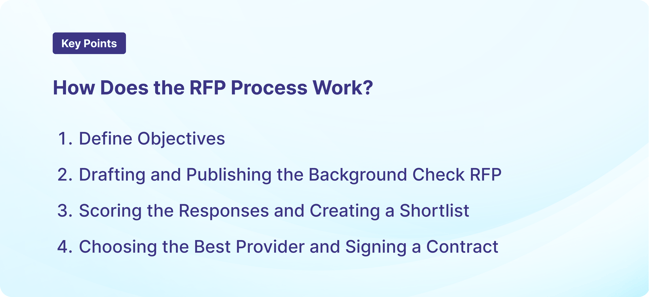
The RFP process should be well defined. You’ll need to decide exactly what you want to know about each corporate background check vendor.
What are the criteria you’ll use to evaluate the responses? You’ll likely want information about the vendors’ accuracy and reliability record, their trustworthiness, technology, report content and quality, turnaround times, compliance process, customer support, and more. Then, you’ll craft your RFP to specifically ask about everything you’re looking for.
In the following sections, we’ll go deeper into four steps to help you create an effective background check RFP process.
The objectives step of the background check RFP process is more about your own company than about the vendors. Defining your objective involves your internal team coming together to determine:
That final item, the budget, is particularly important. Be transparent about any budget constraints and make sure your team understands them. This helps eliminate surprises for all parties. It also reduces the chances of soliciting bids from vendors that can’t meet your pricing needs.
Here are some tips to help you write a high-quality request for proposal:
Once your RFP is written, you’ll need to invite a select list of companies to submit responses. Doing your research for the most viable vendors online will help you select the top 5 or 6 vendors who have the proven experience to fulfill your needs.
Evaluating all the proposals means scoring them all and then narrowing them down to a handful of top options. To do this:
With your shortlist in hand, it’s time to get down to making a final decision. At this stage:
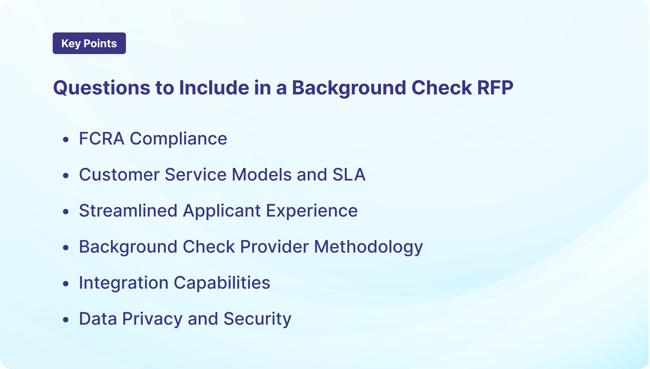
By now you’re probably wondering what kinds of questions to include in your RFP. Every RFP will be different, but there are some things you should ask about in any background check RFP.
The Fair Credit Reporting Act (FCRA) governs many aspects of pre-employment background checks, so hiring companies must adhere to it. One of the ways you can ensure the vendor is compliant is by requiring Professional Background Screening Association (PBSA) accreditation. The PBSA accreditation program has detailed requirements governing business processes and controls specific to the background screening industry. Be sure to ask vendors if they have received this prestigious designation to ensure integrity and FCRA compliance.
Use this opportunity to ask about all aspects of their legal compliance more generally as well. Ask about compliance with local, state, federal, and international regulations.
The vendors should be willing to provide considerable detail about their adherence to consumer reporting laws. Cisive provides FCRA and other legal compliance details on our website. Your RFP questions should elicit even more detail.
You want to be comfortable asking questions and getting support from your background check provider. Your RFP should ask responders to provide details about the size of their support team. Once the vendor has won your business, who will support your account? How is their team trained, and what is their background check expertise? The vendor may offer defined service level agreements (SLAs) to ensure contract commitments are met. Also ask about the channels through which they offer support and the availability of real people rather than automation.
In addition to the vendors’ responses, you should read online reviews. Customer service is often addressed there in an unbiased way. For example, you can read Cisive’s reviews on G2.
Your job applicants and your internal team, expect a streamlined, highly professional application process, including the background check portion. In your RFP, ask the vendors for details on their technology and what makes it a better candidate and client experience. For instance, are results provided in real time? Is an online web portal available to easily manage tasks?
Ask about mobile apps and electronic signatures. Also ask about all the steps an applicant needs to take to complete their part of the background check. Can background check and drug screening reports be accessed from the same platform? Cisive, for example, streamlines the candidate experience with a single platform for signing and submitting documents.
Vendors all use different processes for generating their background checks. Your RFP should ask how vendors verify applicant identities, what quality control measures they use, and how often they audit searches. Do they rely on database searches to report results? Their answers will give you clues about the accuracy of the reports the vendors would provide to you.
If you use a specific applicant tracking system (ATS), you want a background check solution that can integrate with it. Ask vendors what systems they integrate with, what’s involved in integrating, and how long it usually takes. Some ATS partners, such as Workday, offer certifications to vendors who pass a rigorous set of integration standards. Ask your vendor for details on their partnership certification levels.
Background check providers handle sensitive information, including applicants’ personal identifying information. Ask vendors to explain their data security protocols, how they store and transmit information, and whether they subcontract their services. You owe it to your applicants to keep their data safe.
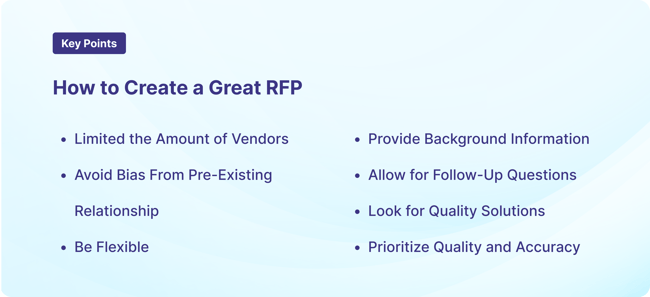
Here are some RFP best practices to keep in mind as you develop your process:
Reviewing RFP responses can be time-consuming. Rather than sending RFPs to large numbers of vendors, do some research beforehand. Identify a group of top background check companies and submit RFPs to a smaller list of qualified vendors. For example, you may only be interested in responses from PBSA accredited providers.
You or someone on your team might already have a relationship with a vendor. Even so, you should still submit RFPs to other vendors. The goal is to make an unbiased selection, not simply go with a provider just because you already know them.
Give vendors some latitude in how they organize and format their responses. Giving them that freedom can cause some proposals to jump out at you and get your attention more than others.
In your RFP, include information about your company’s history, mission, and values. This gives the vendors an idea of what’s important to you. It also makes it more likely that you’ll find a background check provider whose values align with yours.
Don’t back yourself into a corner. You don’t need to choose a vendor as soon as all the RFP responses come in. Give yourself time to ask follow-up questions to your shortlisted vendors.
The quality of a vendor’s RFP response can signal the quality of the services offered. You want to see answers that clearly communicate the vendor’s approach, the scope of their offerings, and more. Clear, comprehensive answers are a good sign of a high-quality provider.
Like many products, background checks have an element of “you get what you pay for.” The lowest-priced, quickest solution is rarely the best. Low-cost providers often provide reports full of errors and old information. These reports can put your employees, your customers, and your company at risk from bad hiring decisions. These decisions can be very costly, from hidden costs of non-compliance with the FCRA to class-action lawsuits. Proven vendors like Cisive provide the highest quality solutions and comprehensive pricing that fit each company’s very specific needs.
Building a thoughtful RFP process is one of the best ways to find a quality background screening services. At Cisive, we have the resources, staff, and technology to safely and securely deliver the best-in-class, highly accurate background checks across industries. In fact, Cisive has an accuracy rate of 99.9994%. Interested in adding us to your open RFP? Speak to a Cisive expert to learn more about our pre-employment background checks.

No hire is a guaranteed success. It’s frustrating to finally fill a much-needed position only to...

Are you overwhelmed by the maze of complexity in your fingerprint background check process? As an...
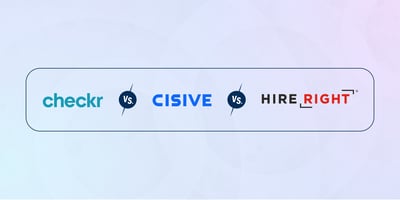
When hiring employees, it’s important that all your systems create a smooth process and secure...